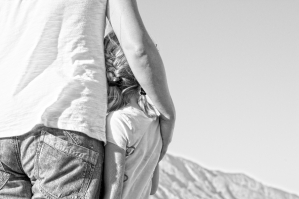
Nga mihi ki te hunga e whai ana i to rātou whainga… (Greetings to everyone who is pursuing their purpose),
The text for this month is Psalm 34:4-7 (NLT), “I prayed to the LORD, and he answered me. He freed me from all my fears. Those who look to him for help will be radiant with joy; no shadow of shame will darken their faces. In my desperation I prayed, and the LORD listened; he saved me from all my troubles. For the angel of the LORD is a guard; he surrounds and defends all who fear him.”
I departed Taiwan earlier than planned so I could be around to help my extended family as necessary. I was honoured to be asked to officiate and took responsibility for organising the service. Uncle was quite the quintessential kiwi bloke — a builder, hunter, fisherman, indoor and outdoor bowler, keen rugby supporter, and Working Men’s Club patron. Over 300 people attended his funeral, an unusually large number for an 80-year-old in that part of the country. Very few would have been church goers. Psalm 34:4-7 was the text I chose for the homily.
…the meaning of salvation: to be saved, to be rescued from harm. Not only rescued but also kept safe.
Uncle was the closest adult male that I could trust and rely on to protect me if needed—a calm, steady influence in my life. He was far from perfect, but he was a safe person for me. At the funeral I used this example to illustrate one aspect of the meaning of salvation: to be saved, to be rescued from harm. Not only rescued but also kept safe. We so often get caught up in the high theology and spirituality of such terms that we forget the significance of Jesus’ promise of presence in a more immediate and tangible way.
Safety is central to our wellbeing. Our sense of safety has an immediate impact on our physical health, emotional stability, social harmony, economic viability, psychological growth, as well as our spiritual maturity. Even the slightest glance at the news or social media today reveals a dramatic increase in instability resulting in a corresponding decrease in a sense of safety, psychologically if not physically. For those privileged to live in stable homes and societies, this can be a shocking realisation. Drawing on my experience of safety at Aunty and Uncle’s place, I spoke at the funeral of how their example informed my understanding of salvation in the Bible. I testified that because of the presence of Jesus I have felt similarly protected in some of the most unsafe places and moments of my adult life—even in Akron Ohio when confronted aggressively in the nearly deserted carpark of a derelict mall! That’s not to say that I haven’t been scared or that incidents weren’t traumatising, but I have a deep and abiding confidence that God is with me. Immanuel. Because of His presence I live with a conviction that, should tragedy befall me, good will come of it.
We do not just ignore or perversely permit wickedness, we work to resist and rectify it, to create good in ‘all things’ with God.
We must be careful how we apply such knowledge. It is too easy to use texts like Romans 8:28 as platitudes in such a way that diminishes the trauma of an injustice or abuse, which can too easily retraumatise victims. On the contrary, Romans 8:28 is better understood as a call to do justice, not a suggestion that God permits injustice for our ultimate good. In affirmation of the Revised Standard Version, N. T. Wright argues that the verse should read, “We know, in fact, that God works all things together for good with those who love him, who are called according to his purpose” (Into the Heart of Romans). With, not for. That switch makes a world of difference. In the past, “All things” inferred also wicked things. But the implication that God is content with the means because they mysteriously justify the ends is just plain horrid. In the context of Paul’s magisterial letter to the Romans, this verse actually points to the opposite and it is fundamentally missional. It says that we have a responsibility (and honour) to co-create New Creation with God — to work against injustice, to call out evil, to create safe spaces for those affected by unrighteous acts. We do not just ignore or perversely permit wickedness, we work to resist and rectify it, to create good in ‘all things’ with God. New Creation is Jesus’ safe space. Our purpose this side of eternity is to work together to build and maintain spaces that offer safety and protection in this world, as fragile and temporary as they may be. Pockets of New Creation are a testament, a witness, to the permanent and infinitely more glorious New Creation to come with Jesus’ explosive physical return.
We are called to co-create communities that are comfortable with sitting in the discomfort of other people’s pain, offering them safe spaces to process their trauma.
New Creation spaces (aka ‘churches’) are not intended to be escapes from the world but points of intersection with the world, offering a portal of hope, a gateway to an alternate, loving, and peace-filled reality ruled by Christ. Rather than just sitting in a lala land of spiritual bliss for 90 minutes on a Sunday morning (or whatever length your liturgy is), we are called to co-create communities that are comfortable with sitting in the discomfort of other people’s pain, offering them safe spaces to process their trauma. To process at the pace of the Holy Spirit, not at the speed of our desire to rush toward some culturally crafted moral perfection. Anyone who has trained in trauma and grief counselling will know how long and difficult such a process can be, but safe communities that keep in step with the Spirit can greatly accelerate healing in people and communities.
Sadly, Christian spaces have not always been safe for vulnerable people. We all know the tropes about Catholic priests, but Protestant spaces are not immune to similar abuses, as the Aotearoa New Zealand Royal Commission of Inquiry into Abuse in Care makes abundantly clear. Even among missionaries, once thought to be the most devout of Protestant professions, exists a long case-history of abuses. On 19 May 2024, the Stuff news outlet ran an article by Steve Kilgallon concerning historic cases of abuse by a well-known missions organisation (which Steve unhelpfully labelled a “sect”). The story was told from the perspective of two former Missionary Kids from New Zealand, now in their 50’s. It is sobering (to say the least!) to read of the effects of abuse on these two.
Matthew 18:2-6 ought to ring loud, long, and clear in our ears.
Many such testimonies can be found around the internet, involving numerous missionary organisations. Public allegations of abuse (historic and current) rocked the missionary world in the late 2000’s and early 2010’s, but from the turn of the century international missionary agencies had been scrambling to strengthen their “safeguarding” policies to better screen for predators and activate improved processes to keep their people safe. The cascade of public cases that followed merely confirmed what was already being uncovered. Public testimonies provide no shortage of case studies for training missions leaders concerning the need to better protect our young and other vulnerable people for whom such organisations hold a duty of care (including those being ministered to). When I was safeguard training I remember thinking that Matthew 18:2-6 ought to ring loud, long, and clear in our ears.
Last year I attended the International Third Culture Kids (TCK) conference in Chiang Mai, Thailand and heard ‘Missionary Kids’ (MKs) recounting tragic stories of their lives growing up in missionary contexts. MK’s were not alone though. TCKs include children of staff in multi-national companies, diplomats, foreign military, and aid agencies. I sat at dinner one night with a Human Resources leader of a major non-religious NGO. This leader, a non-practicing Jew, expressed gratitude to the Evangelical missionary community for caring enough to create TCK resources that many others are learning from in contexts where the value of vulnerable people is diminished in the pursuit of utilitarian outcomes. While rarely reported, the multi-national world, reliant as they are on international schools and communities to care for their children, is possibly even more prone to predators and exploiters of the vulnerable. May we continue to be at the forefront of care in our efforts to co-create New Creation, as a witness to the world. As the prophet said, “Let justice roll on like a river, righteousness like a never-failing stream!” (Amos 5:24).
The exposure of abuse in Christian contexts and under the toxic power of prominent Christian leaders is a winnowing fork in the hands of the Lord.
Safety is a tangible expression of New Creation. The exposure of abuse in Christian contexts and under the toxic power of prominent Christian leaders is a winnowing fork in the hands of the Lord, beginning with the house of the Lord (cf. Matt 3:12 and 1 Peter 4:17). It should never be. From our safe space in Christ, let us make every effort to live righteously and act justly. As I said at the funeral, “Some people may never have experienced the sense of safety and security that I’m describing. Perhaps that’s a major problem with our world. As they say, hurt people hurt people. But that shouldn’t stop us from looking for a safe space or being a safe space for others. It is not an unrealistic expectation.” Especially not for those who are “called according to his purpose” (i.e. lovers of God who follow Jesus, if you didn’t get the memo).
The verb in Romans 8:28 is synergeō, from which I derive the concept of co-creating. We are co-labourers with God in Jesus’ formation of New Creation, where inhabitants are “radiant with joy (with) no shadow of shame”. You cannot get more holistic than this when you consider the scope of God’s purposes in the world. Let us not forget that as we fulfil our calling, synergistically, to ensure that we #stayonmission.
Arohanui ki a koutou e haere ana ki te ao (love to you all as you go into the world),
Dr Jay Matenga is a Maori theologian of missions practice. He leads Missions Interlink NZ, the missionary alliance of Aotearoa New Zealand, from which he is seconded for half his time to lead the World Evangelical Alliance’s Mission Commission. Prior to his 2015 appointment with Missions Interlink, Jay served for 15 years as the Director of Pioneers and 5 years before that with WEC International, sending and caring for missionaries from New Zealand. His MA studies (All Nations Christian College) investigated relationships of power within missions structures and his doctoral research (Fuller Seminary) led to his development of an Industrial and Indigenous values spectrum as a way of understanding intercultural interactions, which can provide a pathway to maturity through transformative tensions.





